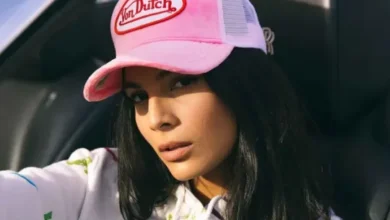Shakira Makedonka: Exploring Her Cultural Impact

The internet is a wild place, isn’t it? One day, you’re scrolling through social media, and a name like Shakira Makedonka pops up, sparking curiosity and maybe a bit of confusion. Is she a person, a meme, or something else entirely? It’s a fascinating mix of global pop culture and regional pride that’s captured the imagination of online communities. In this article, we’re diving deep into the origins, cultural significance, and digital evolution of Shakira Makedonka, unpacking why this name resonates so strongly and how it’s shaping conversations online.
Table of contents
The Origins of Shakira Makedonka
Let’s start with the name itself. But “Makedonka”? That’s a Slavic term, often used to describe a woman from Macedonia, carrying a sense of cultural pride and feminine identity. When you put the two together, you get something that feels both familiar and fresh a nod to global celebrity culture fused with Balkan heritage. The term seems to have emerged from the creative chaos of the internet, where users began combining these elements to create a persona that’s part satire, part celebration.
There’s no concrete evidence that Shakira Makedonka is a real person in the traditional sense. Instead, it’s more like a digital archetype, a character born from memes, parody accounts, and the playful ingenuity of online communities. Some sources suggest it started as a humorous take on blending Shakira’s global appeal with Macedonian cultural identity, perhaps as a way to celebrate Balkan women who embody confidence, style, and a bit of flair. Others point to it as a form of modern folklore, evolving in real-time through TikTok videos and Instagram posts. Whatever its origins, Shakira Makedonka has become a canvas for creativity, reflecting the internet’s ability to turn a quirky idea into a cultural phenomenon.
Cultural Layers Behind the Name
The beauty of Shakira Makedonka lies in its layered meaning. At its core, the name is a mashup of global and local influences. Shakira, with her Latin pop anthems and Middle Eastern-inspired dance moves, represents a kind of universal stardom. Her music has always been about crossing borders, blending Latin rhythms with global sounds. Adding “Makedonka” grounds this global icon in a specific cultural context—Macedonian heritage, with its rich traditions of music, dance, and community.
In Slavic languages, “Makedonka” is a feminine term, often used to signify a woman from Macedonia. It carries a sense of pride, resilience, and cultural identity. By pairing it with Shakira’s name, creators are crafting a persona that’s both aspirational and relatable. It’s as if they’re saying, “What if a Macedonian woman could embody the boldness and charisma of a global pop star?” The result is a character who’s loud, confident, and unapologetically herself—a celebration of feminine power with a Balkan twist.
This blending of identities speaks to a broader trend in digital culture: the fusion of global and local. In an era where globalization often flattens cultural nuances, Shakira Makedonka stands out as a symbol of hybrid identity. She’s a nod to diaspora youth who navigate multiple cultures, mixing their heritage with the influences of global pop culture. It’s no wonder the name resonates with younger audiences, particularly in Eastern Europe and the Balkans, where pride in local traditions meets an embrace of modern trends.
The Digital Rise of Shakira Makedonka
So, how did Shakira Makedonka go from a quirky internet creation to a viral sensation?. Platforms like TikTok and Instagram have been instrumental in spreading the term, with users adopting it in bios, parody accounts, and meme pages. You’ll find videos of young creators lip-syncing to Shakira’s hits while wearing traditional Balkan outfits, or crafting glamorous edits that exaggerate the persona’s confidence and style. It’s playful, it’s bold, and it’s incredibly shareable.
What makes Shakira Makedonka so appealing is her versatility. On TikTok, she might appear as a comedic caricature, complete with dramatic makeup and over-the-top dance moves. On Instagram, she’s more likely to be a symbol of cultural pride, with posts celebrating Macedonian traditions alongside modern fashion. This adaptability allows the persona to thrive across different platforms, each one adding its own spin to the narrative. Social media algorithms love this kind of contentengaging, relatable, and just a little bit absurd—which helps explain why the term has spread so quickly.
Content creators have also latched onto Shakira Makedonka as a way to stand out in a crowded digital space. By embracing the persona, they can tap into a niche audience while still appealing to a broader crowd. It’s a smart move from an SEO perspective, too. As searches for “Shakira Makedonka” grow, creators are leveraging the term to boost their visibility, creating a cycle of curiosity and engagement. It’s a textbook example of how digital culture can amplify a concept, turning a niche idea into a global conversation.
Shakira Makedonka as a Symbol of FeminPower
One of the most compelling aspects of Shakira Makedonka is her role as a feminist icon—albeit a satirical one. This persona isn’t about being quiet or conforming to expectations. She’s loud, sparkly, and unapologetically herself, embodying a kind of feminine power that challenges stereotypes. In many ways, she’s a response to traditional notions of what women—especially Balkan women—should be. Instead of being subdued or overly traditional, Shakira Makedonka is bold, expressive, and unafraid to take up space.
This resonates deeply with younger audiences, particularly women, who see her as a celebration of confidence and individuality. She’s not just a meme; she’s a statement about owning your identity, whether that’s through dance, fashion, or cultural pride. By blending Shakira’s global charisma with Macedonian roots, the persona challenges both Western and Balkan stereotypes, creating a space for women to be multifaceted and proud of their heritage.
The Musical and Artistic Connection
While there’s no official “Shakira Makedonka” album or artist, the persona has inspired a wave of creative expression. On platforms like YouTube and TikTok, users have created remixes that blend Balkan folk music with Latin pop or modern electronic beats, embodying the spirit of this hybrid identity. These creations often feature traditional instruments like the tambura or gajda alongside Shakira’s signature rhythms, creating a sound that’s both nostalgic and forward-thinking.
Dance is another key element. Shakira’s iconic belly dancing has always been a hallmark of her performances, and the Shakira Makedonka persona takes this to the next level. Creators might pair her moves with Balkan dance styles, creating choreography that feels both familiar and fresh. It’s a reminder of how music and movement can bridge cultures, bringing people together through shared creativity.
This artistic fusion isn’t just for fun—it’s a powerful statement about cultural identity. By blending Macedonian traditions with global pop, creators are preserving their heritage while making it relevant to a modern audience. It’s a way of saying, “Our culture isn’t stuck in the past; it’s alive and evolving.”
Controversies and Criticisms
Of course, no internet phenomenon is without its controversies. Some critics argue that Shakira Makedonka risks stereotyping Balkan women, turning cultural identity into a caricature for likes and shares. There’s a fine line between celebration and mockery, and not every creator gets it right. For some, the exaggerated personas and comedic videos can feel like they’re poking fun at Macedonian culture rather than honoring it.
There’s also the question of cultural appropriation. Is it okay for non-Balkan creators to adopt the Shakira Makedonka persona? Some argue that it’s a form of appreciation, a way to celebrate a culture they admire. Others see it as outsiders profiting off a heritage that isn’t theirs. These debates highlight the complexities of digital culture, where intentions can be misinterpreted, and context matters.
Despite these criticisms, many defend Shakira Makedonka as a positive force. When used respectfully, the persona can be a celebration of Balkan identity, giving voice to a region that’s often underrepresented in global pop culture. The key is authenticity creators who approach the term with genuine respect and understanding tend to resonate more with audiences.
The Marketing Potential of Shakira Makedonka
From a marketing perspective, Shakira Makedonka is a goldmine. The term’s viral nature makes it a powerful tool for brands looking to connect with younger, culturally savvy audiences. Some meme accounts have already started selling merchandise think hoodies and phone cases emblazoned with the Shakira Makedonka name. With the right strategy, this persona could evolve into a full-fledged brand, especially among Gen Z, who love irony and cultural fusion.
Businesses could also use the term in content strategies, creating campaigns that tap into its playful energy. For example, a fashion brand might launch a line inspired by Shakira Makedonka’s bold aesthetic, blending Balkan patterns with modern streetwear. The key is to balance authenticity with creativity, ensuring the brand doesn’t come off as exploiting a cultural trend.
For an example of how cultural phenomena can inspire creative marketing, check out our article on how digital trends shape modern branding. It’s a great look at how businesses can stay relevant in a fast-moving online world.
The Future of Shakira Makedonka
Where does Shakira Makedonka go from here? It’s hard to predict the trajectory of an internet phenomenon, but the persona shows no signs of slowing down. As more creators adopt the name, we might see it evolve into something more structured perhaps a branded character, a music project, or even a cultural movement. There’s also potential for Shakira Makedonka to become a symbol of cross-cultural collaboration, inspiring artists and creators to blend their heritages in new and exciting ways.
One thing is clear: Shakira Makedonka is more than just a meme. She’s a reflection of how digital culture can create meaning, spark conversations, and celebrate identity. Whether she’s a parody, a feminist icon, or a cultural bridge, her impact is undeniable.
Conclusion
Shakira Makedonka is a testament to the internet’s ability to create something vibrant and meaningful out of seemingly disparate elements. By blending the global appeal of Shakira with the cultural pride of “Makedonka,” this persona captures the imagination of online communities, offering a playful yet powerful commentary on identity, femininity, and cultural fusion. Whether she’s inspiring dance videos, sparking debates, or fueling creative expression, Shakira Makedonka is a reminder that the internet can be a place of connection and celebration. As her story continues to unfold, one thing is certain: she’s here to stay, shaking her hips and breaking stereotypes along the way.
FAQs
Is Shakira Makedonka a real person?
No, Shakira Makedonka isn’t a real person in the traditional sense. She’s more of a digital persona, created through memes and social media content, blending Shakira’s global fame with Macedonian cultural identity.
Why is Shakira Makedonka so popular online?
Her popularity comes from her versatility—she’s funny, relatable, and a symbol of cultural pride. Social media platforms like TikTok and Instagram amplify her reach, with creators using the persona to express humor and identity.
Does Shakira Makedonka have any music?
There’s no official music under the Shakira Makedonka name, but creators often remix Balkan folk with pop or Latin rhythms to embody the persona, creating a unique fusion of styles.
Is it okay to use the Shakira Makedonka name in content?
It depends on how it’s used. When done respectfully, it can celebrate Balkan culture. But creators should be mindful to avoid stereotypes or mockery, focusing on authenticity instead.
Can Shakira Makedonka become a brand?
Absolutely! The name’s viral appeal and cultural resonance make it a strong candidate for branding, especially for products targeting Gen Z or those celebrating cultural fusion.
What does Shakira Makedonka represent?
She represents a blend of global and local identity, celebrating feminine power, cultural pride, and the creativity of digital communities. She’s a symbol of how the internet can reshape cultural narratives.





